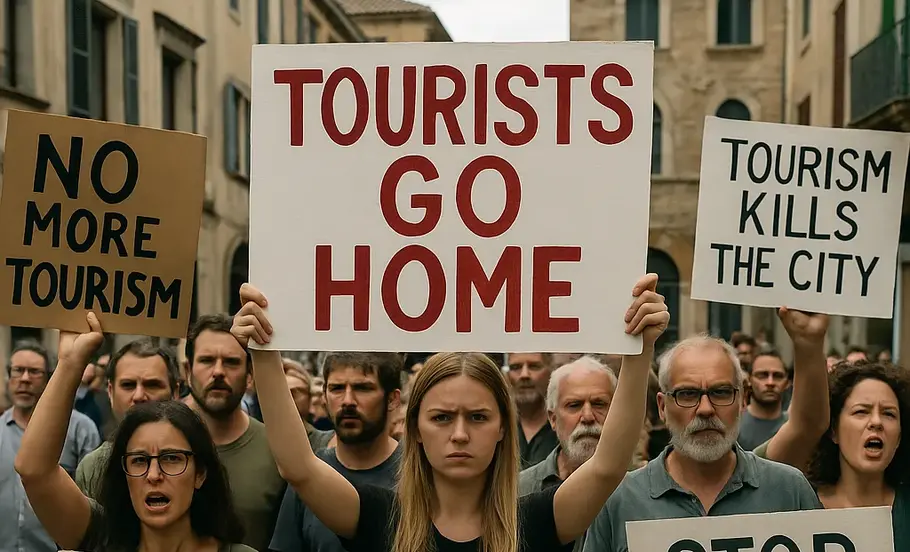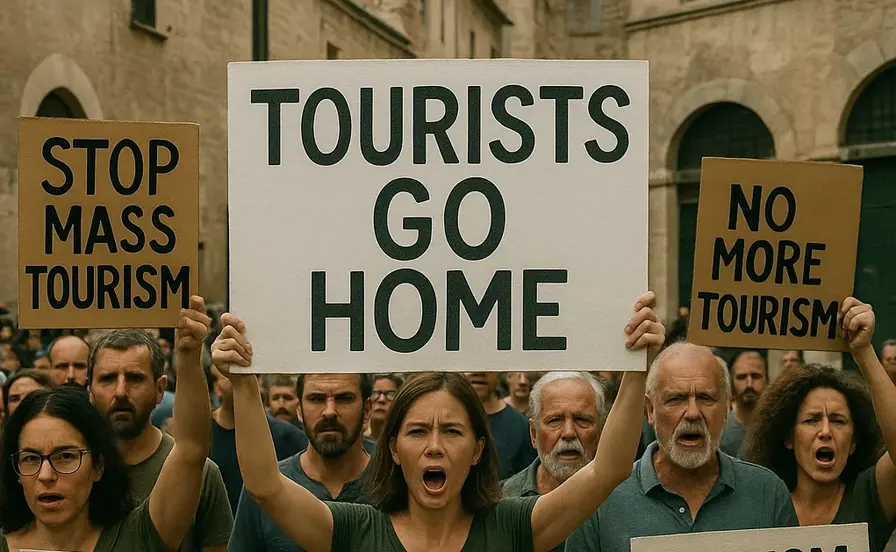In the summer last year, tourists flocking to Europe’s most popular destinations are being met with an unexpected reception: widespread protests against over tourism. From Barcelona’s crowded streets to the coastal towns of Italy and Portugal, local residents are taking a stand against what they perceive as unsustainable tourism levels that are fundamentally altering their communities and quality of life.
The Rising Tide of European Over Tourism Protests
The summer last year has witnessed an unprecedented surge in anti-tourism demonstrations across Southern Europe. In Barcelona, thousands of protesters recently took to the streets, some even armed with water pistols, to express their frustration with the overwhelming influx of visitors. Similar scenes have unfolded in cities across Spain, Italy, and Portugal, marking a significant shift in how locals perceive the tourism industry that has long been a cornerstone of these economies.
This growing movement against European overtourism represents a tipping point for communities that have endured years of increasing tourist numbers without seeing proportional benefits to their quality of life. In fact, many residents now view tourism as actively harmful to their cities and towns.
Barcelona: Ground Zero for the Overtourism Crisis
Barcelona has emerged as the epicenter of European over tourism protests. The statistics tell a startling story: approximately 26 million tourists visited Barcelona in 2024—a staggering number for a city with just 1.6 million residents. This means that for every local resident, roughly 16 tourists pass through the city annually.
A recent city-conducted survey revealed that 31% of Barcelona residents now view tourism as harmful rather than beneficial to their community. This sentiment represents a dramatic shift from the generally positive attitude toward tourism that prevailed in previous decades.
One protester expressed the community’s frustration: “We need responsible tourism, not mass tourism. We need tourism that respects health, work, dignity, and all the workers who work in this non-tourist sector, because all it brings us is poverty. We don’t benefit from this tourism, this mass tourism.”
🌍 Affected by Tourism Protests in Europe?
Living in a city overwhelmed by mass tourism and rising living costs?
Explore job opportunities outside of high-impact tourist zones — including roles in sustainable tourism, remote work, and regional development.
WhatJobs helps you find resilient, community-focused careers that offer long-term growth without the disruption of overtourism.
👉 Browse flexible and sustainable jobs now — and reclaim your work-life balance.The Real Costs of Overtourism
The European overtourism protests 2024 are driven by concrete concerns about how mass tourism affects daily life for local residents. These impacts extend far beyond mere inconvenience or cultural clashes.
Housing Crisis and Displacement
One of the most significant consequences of overtourism is its effect on local housing markets. As property owners convert long-term rentals into more profitable short-term tourist accommodations, housing availability for residents plummets while prices soar.
“It affects our housing because they’re increasingly evicting us from apartments to turn them into tourist accommodations,” explained one Barcelona resident participating in the protests.
This housing pressure creates a domino effect:
- Reduced availability of long-term rentals
- Skyrocketing rent prices beyond what locals can afford
- Displacement of residents from their traditional neighborhoods
- Transformation of residential areas into tourist zones
- Loss of community cohesion and local character
According to a study by the European Commission, cities with high tourism density experience housing cost increases at rates 20-30% higher than comparable cities with more balanced tourism levels.

Economic Paradox: Tourism Wealth Without Local Prosperity
Despite the common assumption that tourism brings economic prosperity, many locals in protest-affected areas report experiencing the opposite effect. The European over tourism protests 2024 highlight a growing awareness that tourism revenue often fails to translate into improved quality of life for residents.
“We want an economy that can bring prosperity to the city to benefit the neighbors. And that economy is not tourism, we know because we’ve been like this for years and all we’re achieving is more precariousness, more poverty, and people leaving the city,” stated another protester.
This economic paradox manifests in several ways:
- Tourism-focused jobs often offer low wages and seasonal employment
- Local businesses are replaced by tourist-oriented establishments
- Cost of living increases outpace wage growth
- Economic benefits concentrate among property owners and large tourism businesses
- Traditional industries and diverse economic activities diminish
Research from the World Tourism Organization suggests that destinations with more diversified economies and regulated tourism development experience more equitable distribution of tourism benefits.
Cultural and Environmental Impact
Beyond economic concerns, the European overtourism protests 2024 also reflect anxiety about cultural identity and environmental sustainability. Many historic European cities are seeing their unique character eroded as they transform to cater primarily to tourist preferences.
“We simply have to stop it, it’s growing too much. Tourism was good up to a certain point, but now it’s leaving us without homes, without our places in the street, and that has to stop,” explained a concerned resident.
The cultural and environmental toll includes:
- Overcrowding of public spaces and cultural sites
- Noise and waste management challenges
- Strain on local infrastructure and resources
- Loss of authentic cultural experiences
- Environmental degradation in sensitive areas
Solutions and Sustainable Alternatives
While the European overtourism protests 2024 highlight serious problems, they also present an opportunity to reimagine tourism in a more sustainable and equitable form. Several approaches are being discussed and implemented across affected regions:
Tourism Caps and Regulation
Some cities are exploring direct limitations on tourist numbers through various mechanisms:
- Daily visitor limits for popular attractions
- Cruise ship restrictions in port cities
- Regulation of short-term rental platforms
- Tourist taxes that fund local infrastructure
- Designated tourist-free zones in residential areas
Venice has implemented an experimental entry fee system for day visitors, becoming the first city in the world to charge tourists simply to enter the historic center.
Economic Diversification
Communities affected by overtourism are increasingly recognizing the need to reduce their economic dependence on the tourism sector:
- Investment in local industries and businesses
- Support for remote work infrastructure to attract long-term residents
- Development of educational and research institutions
- Promotion of cultural and creative industries
- Strengthening of traditional crafts and production
Barcelona’s 22@ innovation district represents an attempt to diversify the city’s economy by fostering technology and knowledge-based industries.
Responsible Tourism Models
Rather than rejecting tourism entirely, many advocates are calling for more responsible approaches:
- Community-based tourism initiatives
- Fair distribution of tourism revenue
- Promotion of off-season visitation
- Focus on quality experiences over visitor quantity
- Educational components that foster mutual respect
Organizations like Responsible Travel are working to promote tourism models that benefit local communities while minimizing negative impacts.
Global Implications of European Overtourism Protests 2024
The European overtourism protests 2024 are not isolated incidents but part of a global conversation about sustainable tourism and community rights. Similar tensions are emerging in destinations worldwide, from Southeast Asian islands to North American national parks.
These protests signal a paradigm shift in how we think about travel and tourism:
- Growing recognition of tourism as a complex system with social impacts
- Increased emphasis on residents’ rights and quality of life
- Questioning of unlimited growth models in the tourism sector
- Demand for more equitable distribution of tourism benefits
- Call for tourist responsibility and awareness
As one Barcelona protester succinctly put it: “We don’t want to be another Ibiza”—referring to the Spanish island known for its mass tourism model.
Finding Balance in a World of Travel
The challenge highlighted by the European overtourism protests 2024 is fundamentally about balance—how to preserve the cultural exchange and economic benefits of tourism while protecting local communities and environments.
For travelers planning European vacations, these protests offer an opportunity for reflection:
- Consider visiting during shoulder seasons or exploring less-crowded destinations
- Stay in locally-owned accommodations rather than international chains
- Support businesses that employ local residents with fair wages
- Learn about and respect local customs and concerns
- Be mindful of resource use and environmental impact
For policymakers and tourism industry leaders, the message from protesters is clear: sustainable tourism must prioritize resident wellbeing alongside visitor experiences and economic growth.
Learn more about sustainable tourism practices
The Future of European Tourism
As European overtourism protests 2024 continue to make headlines, the future of tourism in these beloved destinations hangs in the balance. The outcome will depend on how effectively stakeholders can collaborate to address legitimate concerns while preserving the cultural exchange and economic opportunities that responsible tourism can provide.
What’s certain is that the era of unchecked tourism growth is facing serious challenges from communities determined to protect their way of life. The protests in Barcelona, Italy, and Portugal may well mark a turning point in how we approach global tourism in the decades to come.
Hiring in the Sustainable Tourism Sector?
Looking for professionals who can help develop and implement responsible tourism strategies? Post your tourism and hospitality positions for free with WhatJobs.
Need Career Advice?
Interested in pursuing a career in sustainable tourism or destination management? Get expert guidance on the skills and qualifications needed to make a positive impact in the evolving tourism industry.
Get Tourism Career Advice
FAQ: European Overtourism Protests 2024
What are the main causes of European overtourism protests 2024?
The European overtourism protests 2024 are primarily driven by concerns about housing affordability, as short-term rentals displace local residents; economic inequality, as tourism profits fail to benefit local communities; and cultural erosion, as historic neighborhoods transform to cater exclusively to tourists.
Which cities are experiencing the most significant European overtourism protests 2024?
Barcelona has emerged as the epicenter of European overtourism protests 2024, with demonstrations drawing thousands of participants. Other protest hotspots include major tourist destinations across Spain, Italy, and Portugal, particularly in cities where tourist numbers vastly exceed the local population.
How are European overtourism protests 2024 affecting the tourism industry?
European overtourism protests 2024 are forcing the tourism industry to reconsider its growth models and impact on local communities. Some destinations are implementing visitor caps, tourist taxes, and regulations on short-term rentals, while tourism businesses are increasingly adopting more sustainable and community-oriented practices.
What can responsible travelers do in response to European overtourism protests 2024?
In light of European overtourism protests 2024, responsible travelers can visit during off-peak seasons, explore less-crowded destinations, stay in locally-owned accommodations, respect local customs and regulations, and support businesses that provide fair wages and working conditions to local employees.




